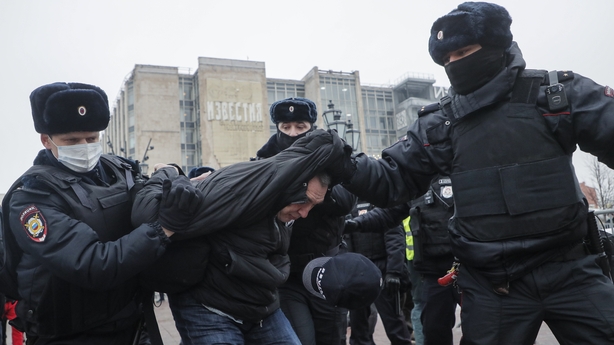Russia has said it is expelling diplomats from Poland, Germany and Sweden for participating in unsanctioned demonstrations last month in support of jailed Kremlin critic Alexei Navalny.
The move comes hours after the European Union's top diplomat Josep Borrell met Foreign Minister Sergei Lavrov in Moscow and described the bloc's ties with Russia as at a "low point" over Mr Navalny's jailing.
Mr Borrell "strongly condemned" the action, a spokesman said, while Sweden branded it "completely unfounded".
The Russian foreign ministry said in a statement that an unspecified number of diplomats from the three EU countries took part in "illegal demonstrations" on 23 January and had been declared persona non grata.
"They were ordered to leave Russia in the near future," the ministry said, adding that Moscow expects diplomats from the countries to "strictly follow the norms of international law" in the future.
Sweden described Moscow's decision to expel one of its diplomats as "completely unfounded", rejecting Russia's claim the envoy had taken part in unauthorised demonstrations.
"The ministry considers this as completely unfounded, which we have also told our Russian counterpart," the Swedish foreign ministry said, adding that it "reserves the right to an appropriate response".
German Chancellor Angela Merkel condemned as "unjustified" Russia's expulsion of European diplomats.
"We consider these expulsions to be unjustified. We believe it is yet another aspect that can be observed right now of Russia being quite far from the rule of law," she said.
Germany's foreign ministry held "urgent talks" with the Russian ambassador.
"State Secretary Miguel Berger called the Russian Ambassador to the foreign ministry today for urgent talks, and made the German position very clear to him," the ministry said in a statement.
Poland also summoned Russia's ambassador to the foreign ministry for talks and warned that the expulsion of its diplomat would deepen the "crisis" in bilateral ties.

Russian police have arrested more than 10,000 people at mass demonstrations across the country where protesters denounced Kremlin rule and demanded the authorities release Mr Navalny.
The 44-year-old opposition campaigner was arrested on his arrival in Moscow last month from Germany, where he had been recovering from a poisoning attack that he blames on Russian leader Vladimir Putin.
Meanwhile, Mr Navalny has gone on trial on charges of defaming a World War II veteran, days after being handed a nearly three-year prison term that sparked an international outcry.
An AFP journalist said Mr Navalny was present in the courtroom, standing inside a glass case for defendants.
Legal pressure has been mounting on Mr Navalny and his allies since he returned in mid-January to Russia from Germany, where he had been recovering from a poisoning attack with the nerve agent Novichok.
He was ordered by a Moscow court this week to serve two years and eight months in prison for violating the terms of a 2014 suspended sentence on embezzlement charges he says were politically motivated.
Alexei Navalny: From poisoning to prison
Mr Navalny is facing defamation charges for describing people, including the 95-year-old veteran, who appeared in a pro-Kremlin video as "the shame of the country" and "traitors" in a June tweet.
The charge carries a maximum penalty of two years in prison and the court was not expected to pronounce a verdict today.
Mr Navalny's detention on his return to Moscow sparked mass demonstrations across the country that saw police arrest 10,000 protesters.
Yesterday, he called on his supporters to fight fear and liberate Russia from a leadership he described as a "handful of thieves", while his aides said more protests were planned for later this year.
Mr Borrell said he had had frank and intense talks with Mr Lavrov in Moscow and called for the release of Mr Navalny.
"I have conveyed to Minister Lavrov our deep concern and our appeal for his release and for the launch of an investigation over his poisoning," Mr Borrell told a news conference alongside Mr Lavrov, referring to Mr Navalny's poisoning in Russia in August.
Mr Borrell added that Russia-EU relations have been marked by "fundamental differences and lack of trust" over the last year.
Mr Lavrov warned that any further deterioration in ties between the EU and Russia could have unpredictable consequences.
He told reporters that Russia and the EU were at odds over many issues, but said both sides had voiced an interest in establishing broader dialogue in areas where they agreed.

